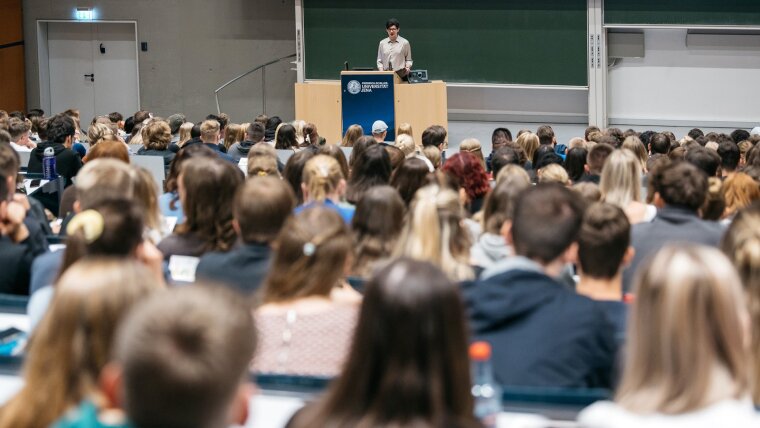
- Studies and Teaching
Published: | By: Thüringer Ministerium für Bildung, Wissenschaft und Kultur
For the eighth time, the Stifterverband and the Thuringian Ministry of Education, Science and Culture are supporting teaching staff in the introduction of innovative digital teaching projects at institutions of higher education. As part of the »Fellowships for Innovations in Digital University Teaching« programme, the state funds each concept with a maximum of 50,000 euros, depending on requirements. Among the ten selected projects are four from the University of Jena, including a cross-institution tandem with the University of Applied Sciences Jena.
AI-supported learning environments for science laboratory practicals, a tool that teaches language skills in Latin in a digital, playful and reflective way or 3D substations for the energy transition—the projects submitted show the diversity of innovative digital teaching concepts at Thuringian institutions of higher education. As part of the »Fellowships for Innovations in Digital University Teaching« programme, ten teaching projects were selected by a jury consisting of teaching staff from the disciplines and university didactics as well as students, and the following fellowships were awarded:
University of Erfurt
- Hasnain Bokhari for the project »Generative AI in Public Policy«
Technische Universität Ilmenau
- Christian Cierpka & Jan Heiland for the project »Modelling Complex Systems with Machine Learning Methods—KoSyMo«
- Dirk Westermann for the project »Virtual Energy Systems—3D Worlds for Communicating Sustainable Energy Systems«
University of Applied Sciences Jena
- Christina Claß for the project »Feedback and Teaching Paths in Jupyter Notebooks«
- Iwan Schie for the project »Personalised learning assistance system based on large language models«
- Lars Schmidl for the project »DigiLab—Digital Teaching and Training Lab«
Friedrich Schiller University Jena
- Tim Haubenreißer for the project »Translation with programme guidance«
- Anika Klafki for the project »KlausI—The digital exam trainer«
- Christoph Steinbeck for the project »KI-supported learning environments for science laboratory practicals: Integration of simulations, virtual labs and machine learning«
Friedrich Schiller University Jena & University of Applied Sciences Jena (cross-institution tandem)
- Denise Schaller & Grit Böhme for the project »Video-based experiential spaces for interprofessional education«
Thuringia’s Science Minister Christian Tischner emphasizes the importance of promoting digital innovations in teaching: »Digital innovations are like a compass on a journey into unknown territory—they show us new paths and open up possibilities that were previously unthinkable. Our university lecturers are the courageous explorers who shape learning environments with creativity and passion, inspiring students and making them fit for the future. The fellowships give these pioneers the freedom they need to advance Thuringia as a centre of science in the long term.«
»In a dynamic world, university lecturers have a central role to play. They are not just imparters of knowledge, but actively shape the learning environments of the future«, says Volker Meyer-Guckel, Secretary General of the Stifterverband. »The high number of applications shows how great the need for support is. This is precisely where the fellowships come in and create targeted scope for innovative teaching.«
The »Fellowships for Innovation in Digital University Teaching« programme is part of the »Thuringian Strategy for Digitalization in Higher Education«, which was updated in 2021 and developed by the Ministry of Science together with the institutions of higher education. The Free State is providing more than seven million euros for its implementation in 2025 alone. The digital strategy for the institutions of higher education comprises a total of seven action fields: Digital university teaching, digital qualification of teacher training, digitalized research processes, open access, knowledge transfer, digitalization in university administration and digital infrastructure.
The Fellowship Programme is a measure from the »Digital University Teaching« area. Fellows are given the opportunity to implement their digital teaching concepts, regardless of whether this involves funding staff positions or technical equipment. The programme also offers the fellows space to exchange ideas and network.
More about the »Fellowships for Innovation in Digital University Teaching« funding programme and the winning projects: https: //www.stifterverband.org/digital-lehrfellows-thueringenExternal link